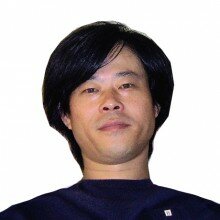
Ya Shi 哑石 (pen name of Chen Xiaoping) has an alchemical genius – in his poetry we are confronted with thoughts and experiences that should not, strictly, be possible. Language, the body, and contemporary Chinese life are all transformed, transmuted into something that feels living and natural, but has a thrilling tendency to ignore the ritual strictures that make our world feel safe. The critic Yi Hang describes him in this way: “combining the ability to understand complexity, the power to perceive in new and fresh ways, and a bizarre imagination . . . Ya Shi’s poems also have a sorcerous, inhuman, fantastic quality, even though his subject matter is real experience from contemporary culture” In Ya Shi’s work, we experience more than beauty, drama, fear, and comedy, we see the way in which the patient hand of the master can turn the raw material of ordinary life into an incantation, a talisman.
Ya Shi(哑石)was born in the city of Guang’an in Sichuan province and raised in a small village whose contact with greater China was sporadic at best. His poetic sensibility was deeply influenced by his upbringing: his work reflects the lushness of the mountain forests, the richness of folk legend, and the macabre spark of ancient ghost stories. In the early 1980s, he won the rare opportunity to study at Beijing University, and now teaches mathematics at a university in Chengdu. In 1990 he turned to poetry; he has published three full-length collections and a considerable number of long poems, most famously a 30-part series titled Qingcheng Poems. He was an editor of the groundbreaking avant-garde magazines Subway and Poetry Mirror, and has won prizes across China. Remaining in Chengdu, when many poets of his stature choose to congregate in Beijing and Hong Kong, he is a resolute iconoclast in a poetry world that badly needs independent voices.
Ya Shi’s individuality doesn’t come from a particular creed or a political ideology, it is a mark of the force of his spirit and the precision of his craft. His poems step delicately across our expectations, connecting our world to form an organic and natural structure with the world of what the critic Yi Heng calls his “bizarre imagination”. In his ‘Birthday Poem’, his speaker feels his own body, sensing it as a Frankenstein-like amalgamation of animal and plant parts; when he looks out into a forest in the poem ‘Eyes of Small Animals’, he sees creatures that are vastly separated from him, helpless in their separation, but connected to one another, and to us, by a web of ethics and empathy.
We realize, on reading these poems, that we are all so separate from one another, and that we must reach out for one another if we are to avoid the crushing loneliness that reappears in so much of Ya Shi’s verse. In ‘White Cherry Poem’, the speaker experiences a visitation of the sentence ‘comb your raven hair fine under the cherry tree’, the presence of the words “like a command” not to a woman with a comb, but to the speaker. You must speak, you must hear and be heard. The poems undertake that reaching out: honest, unflinching, and strange, they map a path from our position into the interior life of a person whose uniqueness and brilliant internal weather have not distracted him from the search for fellowship, and the search for a community that refuses to exploit or exclude.
Selected bibliography
(in Chinese)
Selected Poems by Ya Shi (Changjiang Arts ad Literature Publishing House, 2007)
Carving Bugs (Independent Publishing, 2010)
Velvet Tunnel (Atypical Publishing, 2011)
The Wind Blows Its Own Way (Blade Printing, 2013)
Links
Ya Shi at Lyrikline







